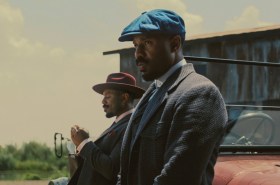‘It was kind of embarrassing how little I knew about dams when I started working on this film,’ co-director and narrator Ben Knight (Uranium Drive-In) explains earnestly at the outset of DamNation, his documentary investigation into the manmade structures that control many of the world’s waterways. His awakening is shared with the audience, as he traverses the history of humanity’s attempts to enforce order on a free-flowing resource. He explores the actions and reasoning of the past, the debate raging in the present, and the way current decisions could impact upon the future.
DamNation may offer a wide-ranging introduction to the matter; however as the title clearly intimates, Knight’s thesis is never in doubt. As chronicled with co-director Travis Rummel (Red Gold) based on a concept conceived by producers Yvon Chouinard and Matt Stoecker, he posits that the frequently labelled ‘green energy’ of dam-based hydropower comes at an unacceptable cost. Most potent within the numerous consequences raised is the impact on the diversity and prosperity of native fish populations, particularly salmon, as demonstrated through the depiction of the reversal of fortune that eventuates when obsolete dams are torn down.
The basic facts presented are unquestionably convincing, starting with the revelation that the 75,000 dams that each reach over three feet in height in the United States equate to the building one per day since Thomas Jefferson was president in the early years of the 19th century. Knight’s voiceover bundles more such data into the film’s rumination on the modern anti-dam movement. While modest counterpoints are offered – including the message that the non-involvement of political advocates of dams sends – the overwhelming bulk of the feature’s focus resides with its primary viewpoint.
A range of interviews fills in further details, in a typical assemblage of talking heads. With footage to match, artists discuss their efforts in rappelling down cliff-faces to paint graffiti and activists convey their intentions in campaigning for the removal of more structures. Further, experts on everything from migration patterns to conservation provide further context, and indigenous inhabitants relate their first-hand accounts of the devastation that dams can wage. Ninety-four year-old folk singer Katie Lee proves the most entertaining on-screen figure, through her recollections of the infamous Glen Canyon area before its reservoir was built.
Of course, it all comes down to the substance at the centre, a truth the filmmakers never ignore. That the majestic sight of water flowing – whether streaming over waterfalls, or coursing through rivers and creeks, or spilling over concrete walls – both bookends and punctuates the discussion perhaps affords DamNation its strongest statement, as well as comprising the film’s most striking visuals. The peacefulness of these shots may contrast, jarringly, with the battle the feature conveys otherwise, but they offer a pertinent and persistent reminder of the cause and the associated costs. Knight’s skills as cinematographer and editor perhaps triumph his endeavours to proffer a nuanced argument; however combined his efforts make for thought provoking viewing on an important environmental topic.
Rating: 3 out of 5 starsDamNation
Director: Ben Knight and Travis Rummel
USA, 2014, 87 mins
Environmental Film Festival Melbourne
www.effm.org.au
September 4 – 12
Actors:
Director:
Format:
Country:
Release:





